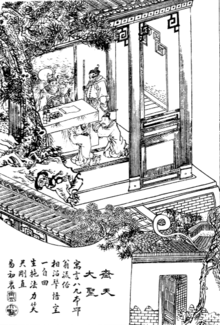The Great Sage, Heaven's Equal
| "The Great Sage, Heaven's Equal" | |
|---|---|

19th-century illustration from Xiangzhu liaozhai zhiyi tuyong (Liaozhai Zhiyi with commentary and illustrations; 1886)
|
|
| Author | Pu Songling |
| Original title | "齐天大圣 (Qitian dasheng)" |
| Translator | Sidney L. Sondergard |
| Country | China |
| Language | Chinese |
| Genre(s) |
Zhiguai Fantasy |
| Published in | Strange Stories from a Chinese Studio |
| Publication type | Anthology |
| Publication date | c. 1740 |
| Published in English | 2014 |
| Preceded by | "The Bookworm (书痴)" |
| Followed by | "The Frog God (青蛙神)" |
"The Great Sage, Heaven's Equal" (simplified Chinese: 齐天大圣; traditional Chinese: 齊天大聖; pinyin: Qí Tiān Dà Shèng) is a short story by Pu Songling first published in Strange Stories from a Chinese Studio (1740). It revolves around Shandong native Xu Sheng, who initially rejects the existence of Sun Wukong but gradually becomes a firm devotee of him after encountering him and experiencing his power. The story acts as social commentary on the worship of mythical characters, in this case Sun Wukong. In 2014, it was translated into English by Sidney L. Sondergard.
Sun Wukong first appeared in the 16th-century Chinese classical novel Journey to the West by Wu Cheng-en. In the novel he is also referred to as "Great Sage, Heaven's Equal" and "Handsome Monkey King". Wu's character was well-received, to the point that some regarded him as a real god. During Pu's time, actual and genuine Sun Wukong shrines were already in existence or emerging, as part of "(t)he cult of this divine monkey". In a larger phenomenon, works of fiction contributed to the public's perception of or belief in deities. Hence, Shahar and Weller, in their 1996 work Unruly Gods, opine that Pu Songling was criticising people's worship of a fictitious character. The translation of the story, titled "The Great Sage, Heaven's Equal" by Sidney L. Sondergard, was released in 2014.
The Martin Bodmer Foundation Library houses a 19th-century Liaozhai manuscript, silk-printed and bound leporello-style, that contains three tales including "The Bookworm", "The Great Sage, Heaven's Equal", and "The Frog God".
...
Wikipedia
